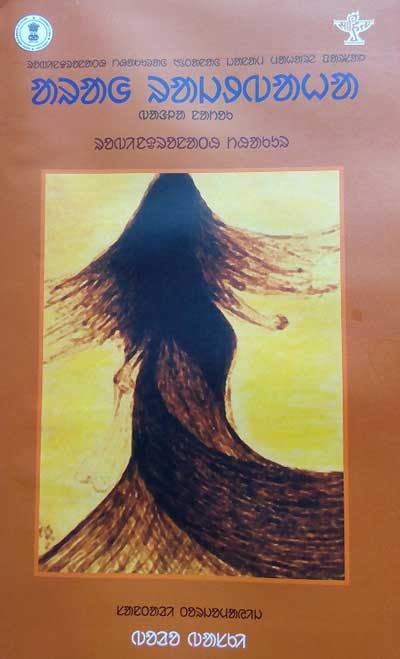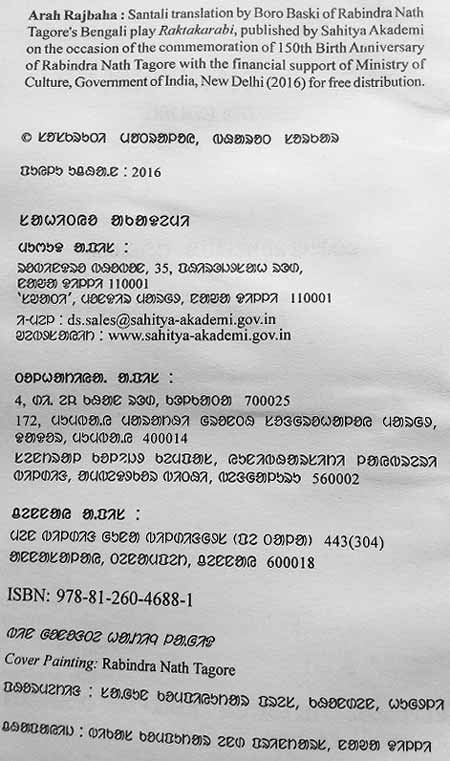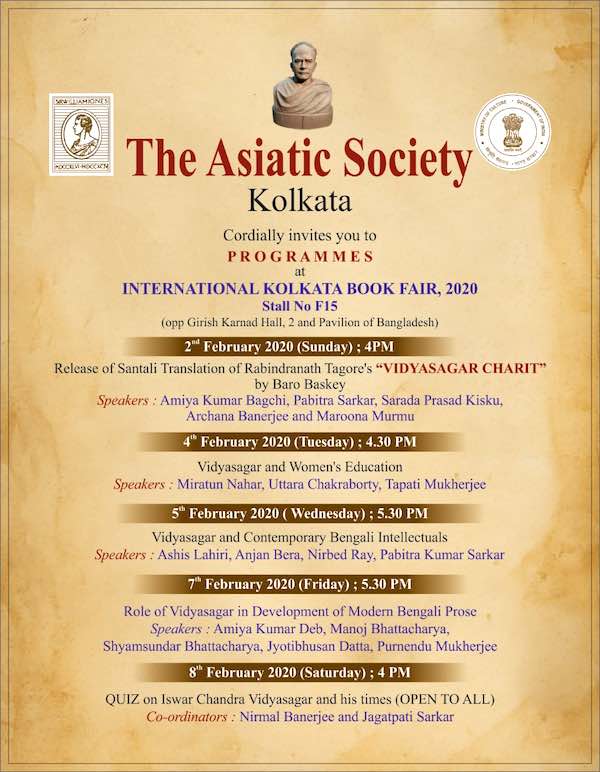The Santali translation of Rabindranath Tagore’s Raktakarabi by Dr. Boro Baski was published by the Sahitya Akademi (www.sahitya-akademi.gov.in) in 2016.

by Dr. Boro Baski (Sahitya Akademi)
Free copies are available from ds.sales@sahitya-akademi.gov.in
“The Jinn of that dead wealth we invoke. If we can enslave him the whole world lies at our feet.“ – Professor to Nandini (the protagonist puzzled to “see a whole city thrusting its head underground, groping with both hands in the dark”) in the 1925 edition of Red Oleanders (p. 6) | Read or download the full English text for free via Archive.org >>
Source: Free Download, Borrow, and Streaming: Internet Archive
URL: https://archive.org/details/dli.ernet.526763/page/n2/mode/1up
Date Visited: 30 April 2023
Red Oleanders, a powerful and moving play, is the story of Nandini, a girl who recognises no social barriers and taboos and who disregards them in her search for happiness. Nandini is one of those individuals who bring out the best in human nature. Entering a town where men are enslaved to mine gold, she makes them aware of their bondage and creates in them a desire to be free.
Source: “Red Oleanders” on Goodreads.com
URL: https://www.goodreads.com/en/book/show/3160662-red-oleanders
Date Visited: 1 May 2023

Human trafficking is a crime. To report in India, call Shakti Vahini
+91-11-42244224, +91-9582909025 or the national helpline Childline on 1098.
National Programme for Child Labour Free India | PDF-Repository (70 KB) >>
“As per a study on human trafficking, the state of Jharkhand has emerged as India’s trafficking hub with thousands of tribal women and girls being trafficked out of the state each year to Delhi, Punjab, Haryana and beyond [while] human traffickers are also involved in many cases of missing children.” – The Wire | Shakti Vahini | Tourism locations | Adivasi tribal bondage slavery trafficking (Safe search) >>
About the play: Red Oleanders (Raktakarabi)
Kathleen M. O’Connell [excerpt from the review of the English translation titled “Red Oleanders” by Nupur Gangopadhyay Lahiri] | Read the full review here >>
Red Oleanders (Raktakarabi) is one of the more than sixty plays, dance dramas and dramatic sketches by Asia’s first Nobel Laureate Rabindranath Tagore. The play, written in 1923-24, was begun during a visit to Shillong, Assam, and inspired by the image of a red oleander plant crushed by pieces of discarded iron that Tagore had come across while walking. […]
The first English version Red Oleanders was done by Tagore himself (with perhaps some assistance from Kshitish Chandra Sen) and published by Macmillan, London, in 1925. The reviews that followed were less than enthusiastic with criticism of obscurantism. Tagore argued that the play’s theme involving unscrupulous capitalism, environmental exploitation and the importance of human relationships was not an obscure one. […]
In 1987, Ananda Lal published a translation of three plays by Tagore, including Red Oleanders, which was a welcome addition to making Tagore’s works accessible in English. Lal’s work represented a faithful recreation of the original work, and it also included pertinent scholarship on the history and context of the plays. His translation of Red Oleanders was finally staged in 2006 at Camden Peoples Theatre in England. […]
Uma Dasgupta reviewing the English translation titled “Red Oleanders” by Nupur Gangopadhyay Lahiri >>
Tagore wanted the play to be an expression of that truth “to which we are so accustomed that we have forgotten all about it”. He did not construe it to be a sermon or a moral. Simply put, it is a play about evil and good, working side by side, about greed and human sympathy, about that which separates fellow beings and that which keeps us together.
Source: “Red Oleanders by Tagore (tr. by Nupur Gangopadhayy Lahiri)–two reviews by Kathleen M. O’Connell, and Uma Dasgupta
Address: http://www.parabaas.com/rabindranath/articles/brRedOleanders.html
Date Visited: Tue Jul 05 2016 13:35:48 GMT+0200 (CEST)


by Dr. Boro Baski (Asiatic Society)
Release of Rabindranath Tagore’s Vidyasagar-Charit in Santali
Kolkata Book Fair, 2 February 2020
Tips
- For more information, type “Tagore tribal village”, “Raktakarabi Tagore”, “Boro Baski Santal”, “Santiniketan Santal” or similar search terms into the search window here: Custom search engine: Govt. of India, NGOs and international organisations >>
- Use the WorldCat.org search field seen below for the above authors and their publications:
Find publications by reputed authors (add “open access” for freely downloadable content)
Dr. Boro Baski works for the community-based organisation Ghosaldanga Adibasi Seva Sangha in West Bengal. The NGO is supported by the German NGO Freundeskreis Ghosaldanga und Bishnubati. He was the first person from his village to go to college as well as the first to earn a PhD (in social work) at Viswa-Bharati. This university was founded by Rabindranath Tagore to foster integrated rural development with respect for cultural diversity. The cooperation he inspired helps local communities to improve agriculture, economical and environmental conditions locally, besides facilitating education and health care based on modern science.
He authored Santali translations of two major works by Rabindranath Tagore, the essay “Vidyasagar-Charit” and the drama Raktakarabi (English “Red Oleanders”), jointly published by the Asiatic Society & Sahitya Akademi (India’s National Academy of Letters) in 2020.
Other posts contributed by Dr. Boro Baski >>
Ghosaldanga Bishnubati Adibasi Trust
Registration under Trust Registration Act 1982
P.O. Sattore, Dist. Birbhum
West Bengal-731 236
India
For inquiries on Santal cultural and educational programs, please contact:
Mob. 094323 57160